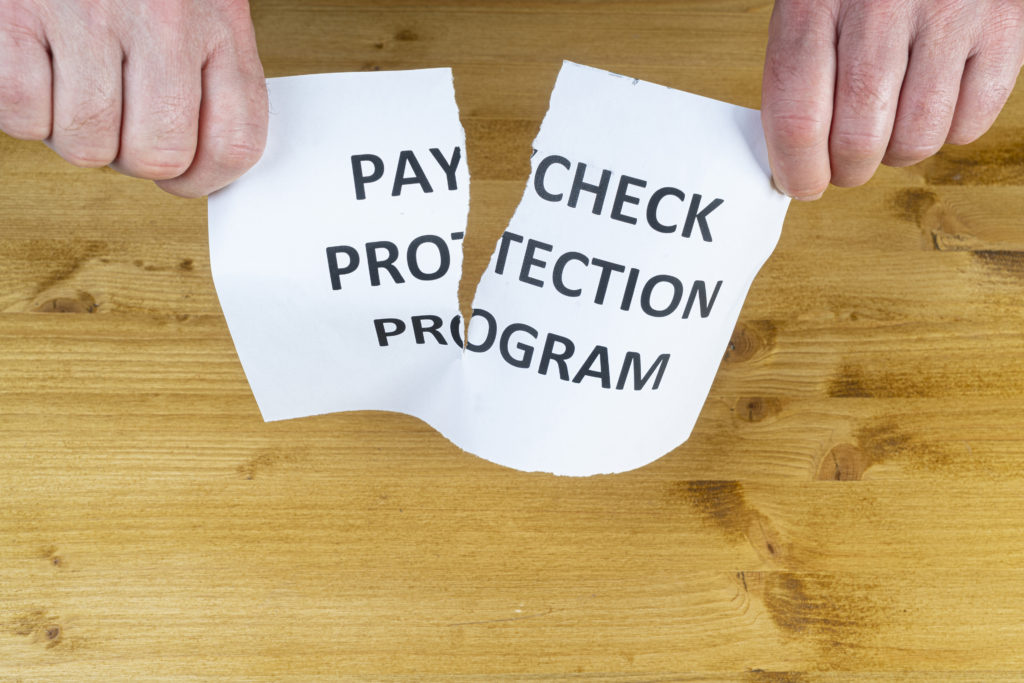Second Division Deems Arbitration Agreements Unconscionable and Executed by Fraud

In a decision recently certified for publication on October 22, 2021, the California Court of Appeals, Second Division, reviewed two versions of arbitration agreements executed between a group of employers and their employees. The decision stems from a class action lawsuit, Yeni Najarro et. al. v. Horizon Personnel Services Inc. et. al., wherein the employees filed eighteen employment related claims against their employers. The employers attempted to hide behind the different versions of arbitration agreements and compel the employees to dispute their claims before an arbitrator which would have prevented the employees from filing a lawsuit in court.
However, the Appellate Court determined that the arbitration agreements were unenforceable as the employee's consent to arbitration was secured by unconscionable terms and fraud in the execution of the agreements. This post will briefly highlight the big picture points of the Appellate Court's decision, and demonstrate how employees can overcome unfair arbitration agreements provided by their employers.
Arbitration Agreement Impact on Employees
We have written before the employers prefer arbitration for various reasons, but arbitration agreements may have a negative impact on employees and disadvantages employees after signing arbitration agreements. It is important to remember that there is an inherent imbalance of bargaining power at the time of hiring - with employers tending to hold all the power over employees. Many employers use this advantage by including arbitration clauses that deprive employees of their right to have their day in court - which was the situation in the Najarro case - and restrict employees in many other ways. The Srourian Law Firm and its attorneys have experience overcoming unfair arbitration agreements and securing employee's employment rights to have their day in court.
What makes an Arbitration Agreement Unconscionable?
In the Najarro class action lawsuit, although there was an arbitration agreement between the employers and employees which delegated power to an arbitrator to preside over and resolve disputes between employers and individual employees, the courts typically have the power to review all agreements or contracts for enforceability.
Unconscionability is one argument employees may raise to have an unfair agreement deemed unenforceable. In California, unconscionability is referred to as the absence of meaningful choice on the part of one party to a contract, and the contract terms unreasonably favor the other party involved in the contract. Unconscionability can be procedural - meaning that during the negotiation process one party may be oppressed or surprised due to having unequal bargaining power. Unconscionability can also be substantive - meaning the substance of the terms will result in overly harsh results to one party and one-sided favorable results to another party.
Applying the doctrine of unconscionability, the Second Division determined that one version of the arbitration agreement was unfair to employees, and therefore unenforceable, because the arbitration agreement (1) forced employee's to waive their right to file a class action lawsuit for employment related claims, (2) the employers did not countersign the agreement, which is required to demonstrate mutual intent to enter into an agreement, and (3) the employees were not provided a meaningful opportunity to negotiate the terms of the arbitration agreement with their employers. Here, the employees were pressured into signing arbitration agreements that took away their power to file a class action lawsuit in court. Underlying the lawsuit was the fact that the employees had difficulty understanding and speaking the English language which the court later addressed in its discussion of fraud in the execution of agreements.
What is Fraud in the Execution?
One key aspect of the Second Division's ruling in Najarro is the court's discussion of fraud in the execution of arbitration agreements and the implications it may have for employees that speak and or read English as a second, or maybe even third or fourth language. In California, a claim for fraud in the execution is not subject to arbitration where the facts can demonstrate that there was not mutual assent between employer and employee to enter into an agreement. Fraud in the execution of an agreement occurs when an employee signs an agreement but is deceived by the employer as to the nature of the agreement; and, the employee does not fully grasp the terms that he or she is agreeing to. In the event that this happens, the court will review the facts underlying the lawsuit in relation to the contract terms to determine whether or not the agreement is void or unenforceable.
In the Najarro lawsuit, the employees were not proficient at reading Spanish and English, nor were they proficient at speaking English. Additionally, the employers - taking advantage of the obvious language barrier - merely handed the arbitration agreements to the employees and referred to the agreement as being "unimportant". Moreover the employers took advantage of the employees by pressuring them to essentially "take it or leave it" when it came to accepting the offer for employment. The employers conditioned the employees employment on on whether or not the employees signed the arbitration agreement.
Basically, the employees were compelled by the employers to sign the arbitration agreement if they wanted to be employed. The employees were not given a reasonable opportunity to read the arbitration agreements or at least have an attorney interpret the agreement for them so that they could understand exactly what they were agreeing to, and what employment rights were being waived. When a situation like this happens, as was the case in Najarro, the court is likely to deem an agreement void or unenforceable because there is no clear intent or mutual assent that the disadvantaged party - here it was non-English speaking employees that also struggled to read Spanish and English - to mutually enter into an arbitration agreement waving vital employment rights.
Each case will depend on the specific facts, so it is important to consult with an experienced labor law attorney to assess the specifics of your case to determine if your employment rights are being violated by an unconscionable arbitration agreement.
Free Consultation
Srourian Law Firm, with locations in Los Angeles, Westwood, Woodland Hills, and Orange County is experienced in all aspects of employment law including arbitration agreements and filing class action lawsuits, and have aggressively represented employees in Los Angeles, Hollywood, Santa Monica, Orange, Irvine, Anaheim, Santa Ana, Newport Beach, Costa Mesa, Fullerton, Tustin, Mission Viejo, San Clemente, Garden Grove, Laguna Niguel, Brea, Fountain Valley, Aliso Viejo, Yorba Linda, Westminster, Laguna Hills, Cypress, and La Habra.
If you or someone you know suffered employment violations, you may have certain employee rights under state and federal law, and may be entitled to compensation as a part of a class action lawsuit. Please contact us to speak with one of our lawyers for a free consultation.
California Appellate Court Upholds Employee's Calculation of Unpaid Wages
In a decision submitted for official publication on October 14, 2021, the Court of Appeal of the State of California Second Appellate District Division Four upheld a trial court’s decision to enter judgment in favor of a warehouse employee for wage violations claims filed in a lawsuit against his former employer. The trial court awarded the employee $99,394.16, of which $42,792.00 accounted for unpaid overtime wages. The case, Byron Jerry Morales v Factor Surfaces LLC et. al., reaffirms California Labor Code and principles of employment law when calculating an employee’s regular rate of pay.
Case Background
Byron Jerry Morales was a warehouse employee employed by Factor Surfaces LLC. The company hired Morales in 2016. Morales performed a variety of duties, vital to the financial success of the company. Morales cleaned and sanitized the warehouse; he accepted shipments of supplies and equipment; he facilitated and personally made deliveries and pick-up of workplace materials; and, he engaged in customer service relations.
In 2018, the employment relationship between Morales and Factor soured, when Factor terminated Morales’s employment, after Morales asked to be compensated for unpaid overtime wages.
In 2019, Morales filed a lawsuit against his former employer, alleging that the company retaliated against him; the company violated California law by failing to maintain and provide employee records and wage statements; the company failed to pay overtime wages, along with meal and rest break compensation; and, for wrongful termination.
The Trial
At trial, Factor Surfaces LLC and its agents Gregory and Bianca Factor, both testified that the company was unable to produce as evidence Morales’s employment records and wage statements as required by statute. The employment records and wage statements would have indicated, at minimum, Morales’s regular rate of pay along with the number of days and hours he worked.
However, the company claimed that the records went “missing” after a truck owned by the company was stolen from inside a gated community. Supposedly, Morales’s employment records were inside the truck, and although the stolen truck was later recovered, the records were not. The company also testified that Morales was not paid commissions for sales.
Morales, however, was able to provide evidence at trial of his regular rate of pay and wage history with his former employer. Prior to March 9, 2018, Morales worked a full-time schedule at his former employer: 8:00 a.m. to 6:00 p.m. Monday through Friday and 9:00 a.m. to 5:00 p.m. on Saturdays. After March 9, 2018, Morales stated that he worked two (2) or three (3) Saturdays per month. Morales estimated that prior to March 9, 2018, he earned eighteen (18) hours of overtime per week, and after March 9, 2018, he earned approximately fourteen (14) hours of overtime per week because he was not working every Saturday.
Morales testified and provided evidence in the lawsuit that his regular rate of pay in 2016 was $120.00/per day, and that he received a three percent (3%) commissions on sales, which at the end of 2017, was reduced to one and a half percent (1.5%). Without explanation, the company cut Morales’s commission on sales to zero (0%). Also, at some point during Morales’s term of employment the company increased his weekly wages to $150.00/per day.

The Trial Decision
The issues of the trial ultimately boiled down to two questions: (1) which side of the lawsuit, Morales or Factor Surfaces, was more credible or believable based on their testimonies and evidence presented at trial; and (2) whether the trial court should accept Morales’s calculation of his regular rate of pay which included unpaid overtime wages and commission sales?
The trial court’s answer to the first question: Morales. In this case, the employee was found to be more credible than the former employer. Morales established that he performed work for the company that was not properly compensated; and, he provided sufficient evidence to demonstrate the amount and extent of work he performed. The burden then shifted to Factor Surfaces to provide accurate and complete employee records and wage statements as required by California law, and the employer could not. The best defense the company could raise was the documents were stolen. With that, the trial court accepted Morales’s calculation of his regular rate of pay while employed by Factor Surfaces. In result, the company filed an appeal challenging the trial court’s acceptance of the employee’s calculation of regular rate of pay.
The Appeal
The Court of Appeal reminds us that – under California Labor Code Sec. 510(4) – overtime pay means “any work performed by an employee in one workday, and work performed in excess of forty (40) hours in any one work week, must be compensated at no less than one-half time times the employee’s regular rate of pay.” Generally, commission workers receive compensation for their commission sales based on a different formula under California law.
However, in this case, because the employee was found to be more credible than the former employer; and the employer failed to provide any records as evidence, the Court of Appeal agreed that the trial court’s acceptance of Morales’s calculation of his regular rate of pay which included unpaid overtime wages and weekly commission sales was proper.
What does this mean?
What this means for employees is that the Court of Appeal is signaling one way to protect job interests against the unfair labor practices of employers. Employees may be able to do this by keeping copies of their wage statements, records of time worked, and work performance. The Court reiterates “where the employer has failed to keep records required by statute, the consequences for such failure should fall on the employer, not the employee. In such a situation, imprecise evidence by the employee can provide a sufficient basis for damages.”
The Court is saying that, even if the employee is not able to provide precise records, if the employee can at least present credible or believable testimony and records of the employee’s wage history and hours worked, it may be sufficient to shift the burden to the employer to prove otherwise; and, if the employer cannot prove otherwise, then it may lead to recovery of commission sales, unpaid overtime wages, and damages in a lawsuit. $25,000.00 of Morales’s award was for emotional distress damages.
Employees should practice saving and cataloguing their pay stubs or weekly paychecks; track missed meal or rest break periods; track duties performed at work and hours worked; and, track the number of wages earned from commission sales. This information could prove to be vital in a lawsuit for damages.
Each case will depend on the specific facts, so it is important to consult with an experienced labor law attorney to assess the specifics of your case to determine if you are owed additional compensation and unpaid overtime wages from your employer.
Free Consultation
Srourian Law Firm, with locations in Los Angeles, Westwood, Woodland Hills, and Orange County is experienced in all aspects of employment law including wage, labor, meal and rest break violations in the workplace, and have aggressively represented employees in Los Angeles, Hollywood, Santa Monica, Orange, Irvine, Anaheim, Santa Ana, Newport Beach, Costa Mesa, Fullerton, Tustin, Mission Viejo, San Clemente, Garden Grove, Laguna Niguel, Brea, Fountain Valley, Aliso Viejo, Yorba Linda, Westminster, Laguna Hills, Cypress, and La Habra.
If you or someone you know suffered employment violations, you may have certain employee rights under state and federal law, and may be entitled to compensation as a part of a class action lawsuit. Please contact us to speak with one of our lawyers for a free consultation.
California Supreme Court Decides Non-Discretionary Payments Are To Be Included When Calculating Overtime Pay
In a published opinion, Ferra v. Loews Hollywood Hotel LLC, 11 Cal. 5th (2021), the California Supreme Court examined the issue of whether the state legislature intended the term "regular rate of compensation" as it is used under California Labor Code Section 226.7(c) has the same meaning as the term "regular rate of pay" pursuant to California Labor Code Section 510(a), so that an employer's calculation of overtime or premium pay owed to an employee must account for the employee's hourly wages and non-discretionary payments for work performed by the employee during missed meal or break and recovery periods. The Court determined that it does!
What are non-discretionary payments?
Non-discretionary payments are payments for an employee's work that are owed under a prior contract, agreement or promise between the employer and the employee. Non-discretionary payments are not determined at the sole discretion of the employer, meaning that an employee will have meaningful input when arriving at the agreement to receive non-discretionary payments from an employer. Examples of non-discretionary payments or wages include hiring bonuses, attendance bonuses, individual or group production bonuses, and incentive bonuses.

What happened in Ferra?
Non-discretionary payments were at the heart of the issue underlying the Ferra lawsuit filed before the California Supreme Court. Jessica Ferra, a bartender employed by Lowes Hollywood Hotel LLC, filed a lawsuit against Loews alleging that the company failed to include her non-discretionary payments - specifically quarterly incentive payments - when calculating her regular rate of pay for overtime or premium payments owed to her for work performed during missed meals, and rest break periods as required by the California Labor Code Section 510(a). Loews argued that under its interpretation of the law, Jessica was only to be compensated her hourly wage - or regular rate of compensation - under California Labor Code Section 226.7(c), meaning that the company should not have to include quarterly incentive payments in calculating overtime or premium payments that Jessica accrued while working through her meal and rest break time.
At trial and on appeal, Jessica Ferra lost both times, meaning the trial court and appeals court agreed with Loews that "regular rate of compensation" and "regular rate of pay" had two different definitions, despite being used interchangeably throughout the California Labor Code and by the Industrial Welfare Commission (IWC). However, the California Supreme Court granted review of Ferra's lawsuit and reversed the lower court decisions. Essentially, the California Supreme Court found Loews' interpretation of the law to be incorrect, and that "regular rate of compensation" and "regular rate of pay" have the same meaning under California wage and labor laws.
To arrive at the conclusion that "regular rate of compensation" under Labor Code Section 226.7(c) and "regular rate of pay" under Labor Code Section 510(a) are synonymous, the California Supreme Court unpacked in detail the lengthy legislative history behind the creation of the Industrial Welfare Commission (IWC); the Court reviewed the state legislature's adoption of California Labor Code Sections 226.7(c) and 510(a); and, it discussed how California's wage and labor policies are intended to mirror federal law where consistent, mainly, the Fair Labor and Standards Act (FLSA). The underlying goal of California and Federal wage and labor laws are meant to protect employees from meal and rest break violations by penalizing employers for non-compliance with meal and rest break laws.
Key Takeaways
One key takeaway from the Ferra lawsuit for employees is that regular rate of compensation and regular rate of pay are synonymous or have the same meaning. The California Supreme Court noted during its discussion of the legislative history that the Industrial Welfare Commission adopted an overtime or premium pay requirement for meal or rest break period violations using the term "regular rate of compensation", while at the same time the IWC issued an adopted wage order revising overtime policies that included use of the term "regular rate of pay". In short, Loews' interpretation was wrong as the Court outlined several instances in California's legislative history where "compensation" and "pay" along with "regular rate" were used interchangeably to describe how employees wages are to be calculated. Ultimately, Ferra determined that employees are entitled to receive non-discretionary wages or payments as part of the calculation for the employee's pay - or compensation - for overtime work performed during missed meal and rest break time.
The second key takeaway from the Ferra lawsuit for employees is that the California Supreme Court ruled that its decision would have retroactive application in workplaces throughout California. What this means is that employees in California may be owed additional overtime or premium pay for non-discretionary wages or payments accrued for work performed by the employee during missed meal and rest break periods that were not calculated in the employee's regular rate of compensation or regular rate of pay. Each case will depend on the specific facts, so it is important to consult with an experienced labor law attorney to assess the specifics of your case to determine if you are owed additional compensation and unpaid wages from your employer.
Free Consultation
Srourian Law Firm, with locations in Los Angeles, Westwood, Woodland Hills, and Orange County is experienced in all aspects of employment law including wage, labor, meal and rest break violations in the workplace, and have aggressively represented employees in Los Angeles, Hollywood, Santa Monica, Orange, Irvine, Anaheim, Santa Ana, Newport Beach, Costa Mesa, Fullerton, Tustin, Mission Viejo, San Clemente, Garden Grove, Laguna Niguel, Brea, Fountain Valley, Aliso Viejo, Yorba Linda, Westminster, Laguna Hills, Cypress, and La Habra.
If you or someone you know suffered employment violations, you may have certain employee rights under state and federal law, and may be entitled to compensation as a part of a class action lawsuit. Please contact us to speak with one of our lawyers for a free consultation.
California Protects Warehouse Employees Against Unfair Labor Practices

The on-going feud between state governments and big tech companies intensified on September 22, 2021 when California Governor Gavin Newsom signed California Assembly Bill 701 (A.B. 701), making California the first state to impose regulations on companies that require warehouse distribution center employees to meet unfair productivity quotas. A.B. 701 - the Warehouse Distribution Centers Bill - amends the California Labor Code to include new provisions taking aim at companies like Amazon that implement unfair labor practices that exploit employees in order to fulfill delivery orders. A.B. 701 also prevents job seekers from being discriminated against when applying for or pursuing a different job if the job applicant filed to receive worker’s comp benefits during prior employment.
What is A.B. 701?
Generally, the purpose of California Assembly Bill 701 (A.B. 701) is to protect warehouse distribution center employees against impending job loss for failing to meet employer established productivity quotas. The author of the new law, California Assemblywoman Lorena Gonzalez states, “worker’s aren’t machines. We’re not going to allow a corporation that puts profits over worker’s bodies to set labor standards back decades just for same-day delivery.” The new law will protect both current and former workers employed at a warehouse distribution center.
What is a productivity quota?
A.B. 701 defines quota as a work standard under which an employee is assigned or required to perform at the specified productivity speed or perform a quantified number of tasks, or to handle or produce a quantified amount of material, within a defined time period and under which the employee may suffer an adverse employment action if they fail to complete the performance standard.
Essentially, a quota is created by the employer or company of which the employee is responsible to meet. The quota consists of the number of tasks the employee is expected to complete within a certain amount of time. The problem arises when the quota is unfair, yet employees are still expected to perform tasks to complete the quota, and if the employee cannot do so, then the employee may experience an adverse employment action.
What is an adverse employment action?
In California, an adverse employment action is viewed as any type of retaliatory action taken by an employer that is reasonably likely to have a negative effect on an employee’s job performance, opportunities for a promotion, or ability to seek employment elsewhere. The most common examples of an adverse employment action are job loss or termination, reduced wages, and demotion to a lower employment position or job title.
What changes will happen because of A.B. 701?
Currently, companies like Amazon are not held accountable for providing employees with adequate notice of their productivity quotas and the adverse employment actions that may occur for failing to meet those quotas. A.B. 701 requires companies to provide more transparency to warehouse distribution center employees. For example, the bill provides greater protections to warehouse distribution center employees in the following ways:
- Employers must provide adequate notice to every existing and new employee in writing describing each quota the employee is responsible to meet;
- Employers must provide notice to all employees in writing of any adverse employment actions that may result from failing to meet a quota;
- Employees will not be required to meet a quota that violates the employee’s right to meal and rest or break time, including using the bathroom;
- Employers are prohibited from taking any adverse employment action against an employee for not meeting a quota if the quota violates the employee’s right to meal and rest or break time, including using the bathroom;
- Employees must receive productive time credit towards any quota for actions taken by the employee to comply with California’s health and safety laws for the workplace;
- Employees may receive productive time credit towards any quota during meals and rest or break time if the employee is required to be on call during those times;
- Current and former employees have the right to request a written description of each quota and a copy of the most recent 90 days of the employee’s performance towards meeting the quota if the employee believes the company created a quota that violates the employee’s right to meals and rest or break time.
Another key component of the new law is that employees will have the ability to file a lawsuit for injunctive relief to obtain court ordered compliance with the law against employers and companies. Employees that are successful in the lawsuit for injunctive relief may be awarded suspension of the unfair quota, the court may reverse an unlawful termination of the employee for not meeting a quota that violated the employee’s labor rights, the employer and company may be ordered to cover the employee’s costs and attorney’s fees for filing the lawsuit. Each case will depend on the specific facts, so it is important to consult with an experienced labor law attorney to assess the specifics of your case.
A.B. 701 is scheduled to take effect in California on January 1, 2022.
Free Consultation
Srourian Law Firm, with locations in Los Angeles, Westwood, Woodland Hills, and Orange County is experienced in all aspects of employment law including Warehouse Employee related health and safety violations in the workplace, and have aggressively represented employees in Los Angeles, Hollywood, Santa Monica, Orange, Irvine, Anaheim, Santa Ana, Newport Beach, Costa Mesa, Fullerton, Tustin, Mission Viejo, San Clemente, Garden Grove, Laguna Niguel, Brea, Fountain Valley, Aliso Viejo, Yorba Linda, Westminster, Laguna Hills, Cypress, and La Habra.
If you or someone you know suffered employment violations, you may have certain employee rights under state and federal law, and may be entitled to compensation as a part of a class action lawsuit. Please contact us to speak with one of our lawyers for a free consultation.
Update on COVID-19 Related Legal Issues

The scope of COVID-19 related lawsuits continues to expand as workers across the country are filing lawsuits seeking protection and damages from unfair labor practices. Moreover, there is a sense that more cases will be filed as more employees are impacted by the pandemic and businesses close, sometimes with little or no notice to soon-to-be unemployed workers.
Congress enacts the Families First Coronavirus Response Act
In March 2020, when Congress realized that a shut-down was imminent, Congress passed the Families First Coronavirus Response Act (FFCRA) which requires certain employers to offer employees paid sick leave or expanded family and medical leave for COVID-19 related reasons. Employees must have been employed for at least 30 days to benefit from FFCRA.
In general, the FFCRA provides for two weeks (up to 80 hours) of paid sick leave with regular pay if the employee is unable to work due to quarantine, or experiencing COVID-19 symptoms. Also, under the FFCRA, if an employee is unable to work due to the need to provide care for another individual under quarantine, or if their child’s school or child care provider closes due to COVID-19, the employee is allowed two weeks (up to 80 hours) of paid sick leave at two-thirds regular pay.
When an employee is unable to work in order to provide child care due to schools or child care being closed, employees are eligible for an additional 10 weeks of paid expanded family and medical leave at two-thirds regular pay.
Shortly after the FFCRA was enacted, a federal lawsuit was filed by an Eastern Airlines executive alleging she was fired after she requested time off under the FFCRA. According to the plaintiff, a single mother, she requested two hours of paid time off each day in order to care for her son, whose school was closed due to the pandemic. On the surface, it appears that the FFCRA was enacted to provide assistance to working parents such as the plaintiff in the midst of the pandemic. In this case, however, Eastern Airlines contends that the former employee was terminated on March 27, 2020, prior to the FFCRA taking effect on April 1, 2020.
COVID-19 and the ADA
Since 1990, the Americans with Disabilities Act (ADA) has provided significant protection to persons with disabilities in the workplace as well as society in general. One key aspect of the ADA is the requirement that employers provide reasonable accommodations to qualified employees with disabilities unless the accommodation would result in undue hardship to the employer. This requirement is quite broad and, for example, protects potential employees during the hiring and training process.
What constitutes a reasonable accommodation depends on the nature of the employee’s disability, the necessary duties of the job, the physical workplace and hardship (if any) to the employer. As a result of COVID-19, however, courts have been asked to consider how COVID-19 impacts established law and perhaps the need to re-interpret the meaning of reasonable accommodation under the ADA.
In June 2020, an engineer filed a lawsuit against his employer alleging discrimination in violation of the Massachusetts state ADA. In March, the employee was allowed to work from home in light of a state “stay at home” order. In April, his employer requested that he return to the office for work, but the employee requested he be allowed to continue to work remotely. The employee, who has high blood pressure and cares for his elderly mother, argues that he is at high risk of serious illness if he contracts COVID-19. He also fears transmitting the disease to his elderly mother who suffers from multiple medical conditions that place her at high risk. When his request for a reasonable accommodation, specifically to work remotely, was denied, he refused to return to the office, and was terminated.
Prior to the pandemic, courts did not consider a request to work remotely to be a reasonable accommodation. However, with increased health risks due to COVID-19, courts will be asked to re-consider whether a request to work remotely due to a heightened health risk of contracting or spreading the virus is a reasonable accommodation under the ADA.
More broadly, attorneys are using novel legal arguments in lawsuits based on the unique circumstances due to COVID-19 and the need to protect employees when current labor laws may be insufficient or simply never considered the challenges posed by the pandemic.
Lawsuits Filed after Employees Die From COVID-19
Sadly, some employees have died from COVID-19, and their families have filed lawsuits claiming that the workplace was not safe and employers failed to protect employees from the deadly virus. The key issue is whether employers followed federal and state safety guidelines, and if the employer failed to ensure proper protocols at work, they may be held liable for the death of an employee who contracted COVID-19 as a result of an unsafe workplace. Employers, however, claim that it is very difficult to prove how or where someone contracts the disease.
In one case, the family of a Safeway employee allege that the work environment was not safe because sick employees were still coming to work. Moreover, according to the lawsuit, on March 20, a memo was posted that stated, “If you are healthy, a mask will not protect you from the respiratory drops an infected person coughs out. Open areas of the mask can let those drops in.” The family filed a lawsuit after the employee tested positive for COVID-19 on April 4 and died eight days later. According to the family, Safeway failed to follow guidelines of the Occupational Safety and Health Administration (OSHA) issued on March 9 that required sick employees to be isolated.
Similar lawsuits have been filed against Walmart. In one case against a Walmart in Illinois, an employee was allegedly told to continue to work despite having symptoms, and was eventually sent home two days later when his symptoms worsened. He died two days later. Another Walmart employee in Dallas has filed a lawsuit that alleges she contracted COVID-19 because Walmart failed to provide personal protection equipment (PPE) and failed to follow health guidelines issued by health agencies including the Centers for Disease Control (CDC) and OSHA. As a result, she claims she contracted COVID-19 from the unsafe work environment at Walmart.
FREE CONSULTATION
Srourian Law Firm, with locations in Los Angeles, Westwood, Woodland Hills, and Orange County is experienced in all aspects of employment law including COVID-19 related health and safety violations in the workplace, and have aggressively represented employees in Los Angeles, Hollywood, Santa Monica, Orange, Irvine, Anaheim, Santa Ana, Newport Beach, Costa Mesa, Fullerton, Tustin, Mission Viejo, San Clemente, Garden Grove, Laguna Niguel, Brea, Fountain Valley, Aliso Viejo, Yorba Linda, Westminster, Laguna Hills, Cypress, and La Habra.
If you or someone you know suffered employment violations due to COVID-19 related health and safety violations, you may have certain employee rights under state and federal law, and may be entitled to compensation as a part of a class action lawsuit. Please contact us to speak with one of our lawyers for a free consultation.
Know the Law. Know your Rights.

Workers are generally protected from unfair labor practices by both federal and state laws. California workers, however, benefit from protections guaranteed under some of the country’s strongest labor laws. However, workers must know their rights in order to challenge illegal acts by employers.
What is the WARN Act?
The “WARN Act” or Worker Adjustment and Retraining Notification Act is a federal law that protects workers by requiring employers to give adequate notice to employees before a mass layoff or closing of a work site. Most states have “mini WARN Acts” which provide similar protections under state law.
The purpose of the WARN Act is to provide employees with sufficient notice of an impending job loss so that they can secure other employment or seek training to pursue a different job. Under the WARN Act, workers are entitled to 60-day notice prior to a mass layoff or closing with some exceptions.
Who is protected under the WARN Act?
In general, the WARN Act protects employees of companies with over 100 active full-time employees including private and public companies as well as non-profit organizations. The Act protects both salaried and hourly employees, but employees must be employed for at least six of the previous 12 months, and must work more than 20 hours a week.
When must an employer give a 60-day notice?
According to the WARN Act, employers must give a 60-day notice in advance of a mass layoff or closing of a work site. The layoff must also be expected to last more than six months. In other words, a temporary layoff or short furlough would not necessarily require a warning under the WARN Act. However, the WARN Act is triggered when any of the following is expected to occur:
• a reduction of at least 33 percent and of at least 50 employees during any 30-day period
• at least 500 full-time employees will be laid off
• closing of a work site will reduce employment by at least 50 employees.
The WARN Act also requires notice be given prior to the “sale of part or all of an employer’s business,” but courts have wrestled with whether this must also result in the termination of employees, and what constitutes a “sale.”
As with many legal issues, you should discuss your situation with an experienced labor attorney to determine whether your rights have been violated.
What happens if an employer fails to comply with the WARN Act?
The federal penalties for violating the WARN Act can be considerable and include paying employees back pay and benefits during the period of violation. In some circumstances, a business is also required to give advance notice to local government officials before the closing of a work site, and failure to provide notice can result in civil penalties.
How has COVID-19 affected the WARN Act?
Needless to say, COVID-19 has resulted in a significant number of layoffs and closures. When the pandemic caused many businesses to shut down in March 2020, the shutdown was largely expected to be temporary. However, as the shutdown continued, employers who failed to provide notice of a mass layoff or closure may argue that the extended layoff (beyond six months) was reasonably unforeseeable, and therefore no WARN notice was required. Under the WARN Act, there are exceptions to the notice requirement. Specifically, the exceptions include “unforeseeable business circumstances” that cause a layoff or business closure.
Whether a WARN Act violation has occurred during the pandemic is often unclear. Each case will depend on the specific facts, so it is important to consult with an experienced labor law attorney to assess your specific case.
For example, a lawsuit has been filed in Florida federal court against Enterprise Rent-a-Car alleging a violation of the WARN Act when an employee was laid off with no notice last April. The plaintiff argues that the reduction in work force was not “unforeseeable” because the company furloughed employees in mid-March when the pandemic initially forced many businesses to shut down.
Does the CA Warn Act provide more protection than the federal act?
Yes. California labor laws generally provide stronger protection to workers than federal law, and the CA Warn Act is no exception. For the most part, the state act is similar to the federal act except the CA Warn Act covers a broader range of employees. In other words, under the CA Warn Act, more workers are entitled to advance notice under the act.
The most significant difference however is the CA Warn Act does not make an exception for “unforeseeable circumstances.” In other words, unlike federal law, businesses may not argue that layoffs or closures due to COVID-19 were due to unforeseeable circumstances, and therefore, advance notice was not required.
Other important differences provide significantly more protection to workers during the pandemic. Unlike federal law, the CA WARN Act applies to temporary job loss regardless of the duration. California law, however, also has exceptions that excuse a business from giving notice. Specifically, the CA WARN Act has exceptions for layoffs due to “physical calamity” or “faltering business.” It is unclear, however, how the courts will define the exceptions, particularly in light of an executive order signed by Governor Gavin Newsom allows for a more flexible notice requirement if certain circumstances are met. This executive order is similar to a federal provision that allows some employers to give notice when “practical” when certain conditions are met and 60-day notice was not given.
FREE CONSULTATION
Srourian Law Firm, with locations in Los Angeles, Westwood, Woodland Hills, and Orange County is experienced in all aspects of employment law including WARN Act violations, and have aggressively represented employees in Los Angeles, Hollywood, Santa Monica, Orange, Irvine, Anaheim, Santa Ana, Newport Beach, Costa Mesa, Fullerton, Tustin, Mission Viejo, San Clemente, Garden Grove, Laguna Niguel, Brea, Fountain Valley, Aliso Viejo, Yorba Linda, Westminster, Laguna Hills, Cypress, and La Habra.
If you or someone you know suffered employment violations due to a WARN Act violation, you may have certain employee rights under state and federal law, and may be entitled to compensation as a part of a class action lawsuit. Please contact us to speak with one of our lawyers for a free consultation.
Worker Sue Department of Labor For COVID-19 Protection
The Occupational Safety and Health Act (OSHA) protects employers from workplace hazards. The scope of protection offered by OSHA is broad and ensures not only a safe work environment free from physical hazards, but also requires employers to provide necessary safety equipment and provides specific guidelines that employers must follow. Since COVID-19, workers have been rightfully concerned with safety, particularly when employers do not provide adequate personal protection equipment (PPE) or modify the workplace to allow for social distancing as recommended by health agencies including the Centers for Disease Control (CDC).
Unfortunately, there is growing criticism that OSHA has been slow to respond and has failed to protect the thousands of workers that have filed safety concerns with the agency. As a result, workers have been forced to work in unsafe conditions as they wait for OSHA to respond to safety complaints which has always been slow, but has come to a virtual standstill due to the increased number of complaints filed in light of increased safety concerns due to COVID-19. Also, since OSHA does not allow workers the right to sue employers directly for alleged safety violations, attorneys have found novel ways to advocate for employees who are concerned with their safety at work and must be protected immediately.
Some workers have filed novel lawsuits against employers under a public nuisance theory. Currently, lawsuits are pending against McDonald’s and Amazon alleging that the companies’ failure to adopt COVID-19 related safety measures has created a risk of public harm because of the increased risk of spreading the virus if workers contract the disease due to workplace safety violations. Therefore, workers are seeking the court’s assistance to order compliance with safety guidelines to protect the health and safety of employees as well as the public. Already, courts have ordered McDonald’s to increase safety measures, and Amazon no longer penalizes employees for taking time to wash hands as recommended by the CDC.

Another way that workers are able to bring their allegations to court is a little-known provision of OSHA that allows workers to seek a court order to compel OSHA to act when the Department of Labor (which enforces OSHA) “arbitrarily or capriciously fails to seek relief.” In other words, workers can ask a court to order the agency to take action against an employer to ensure the workplace is safe in the midst of the pandemic.
In a lawsuit filed in July by meatpackers at a Maid-Rite Specialty Foods factory in Pennsylvania, the workers are asking the court to order the Department of Labor to issue an OSHA citation because the workplace does not allow for appropriate social distancing and masks have not been provided. In this case, OSHA refused to investigate, and instead concluded that there was no “imminent danger” to workers despite the fact that the meatpacking industry has been the source of several COVID-19 related outbreaks across the country.
Specifically, workers allege several safety concerns including Maid-Rite has not modified the production line to allow for social distancing; fails to provide cloth mask; does not allow for enough time for hand washing; and has policies that encourage sick employees to work. By suing the Department of Labor, the employees are challenging the agency’s decision not to investigate and asking the court to compel the agency to protect the health and safety of employees by issuing an OSHA citation for the on-going safety violations. The case is currently pending in the U.S. District Court for the Middle District of Pennsylvania and will certainly have a significant impact on COVID-19 related litigation across the country if Judge Malachy Mannion agrees with the workers and compels the Department of Labor to issue OSHA citations for safety violations.
FREE CONSULTATION
Srourian Law Firm, with locations in Los Angeles, Westwood, Woodland Hills, and Orange County is experienced in all aspects of employment law including health and safety violations in the workplace, and have aggressively represented employees in Los Angeles, Hollywood, Santa Monica, Orange, Irvine, Anaheim, Santa Ana, Newport Beach, Costa Mesa, Fullerton, Tustin, Mission Viejo, San Clemente, Garden Grove, Laguna Niguel, Brea, Fountain Valley, Aliso Viejo, Yorba Linda, Westminster, Laguna Hills, Cypress, and La Habra.
If you or someone you know suffered employment violations due to health and safety violations, you may have certain employee rights under state and federal law, and may be entitled to compensation as a part of a class action lawsuit. Please contact us to speak with one of our lawyers for a free consultation.
Workers File Lawsuits to Protect the Public from COVID-19

As the country continues to battle the pandemic, workers across the country continue to voice concerns for their safety and many have filed lawsuits in order to force employees to provide adequate protections in the workplace. While workers are generally protected from hazards in the workplace by the Occupational Safety and Health Act (OSHA), the process can be slow because complaints to OSHA must be investigated and violations must be found before the agency can force a business to act or face penalties. Moreover, OSHA does not allow workers to sue employers.
In order to ensure their health and safety during the pandemic, some employees have taken a novel approach by filing lawsuits under a public nuisance theory. Under this theory, workers allege employers are creating a public harm by failing to protect employees from contracting COVID-19, and therefore can seek injunctions which would force employers to implement stricter safety precautions to reduce the spread of COVID-19 and therefore ensure public safety.
Obviously, health and safety concerns must be addressed quickly so workers can continue to work in safe environments and reduce the risk of contracting COVID-19. Employers must protect their employees from all hazards in the workplace, and if they fail to ensure proper procedures, workers must seek quick remedies not only for their own health, but for the health and safety of their families and the public.
Employees of McDonald’s Allege a Public Safety Risk
Workers in Chicago allege several local McDonald’s restaurants have failed to implement appropriate safeguards. By placing workers at risk of contracting COVID-19, the workers argue that the employers therefore pose a risk to public safety. Specifically, employees allege they lack sufficient personal protection equipment (PPE) including masks and gloves; reported crowded work spaces that does not allow for proper social distancing; and failed to notify employees when co-workers tested positive for the virus. Five employees of four Chicago area McDonald’s restaurants filed a lawsuit in May which led to a court issuing an injunction and ordering McDonald’s to implement stricter safety protocols and training. While the judge declined to find McDonald’s acted negligently, Judge Eve Reilly held that the four restaurants identified in the lawsuit failed to ensure appropriate safety precaution to protect employees and the public from COVID-19 and therefore “endangering public health.”
Similarly, a judge in Alameda County granted a temporary court order requiring a McDonald’s franchisee in Oakland, CA to increase protective measures after employees filed a lawsuit alleging sick employees were required to work despite having symptoms of COVID-19. Moreover, employees allege that they were not provided masks and were forced to make masks out of coffee filters. The employees went on strike in May, and filed a lawsuit in June. A judge quickly ordered the restaurant to implement protective measures that included social distancing, sufficient PPE and employee temperature checks.
McDonald’s operates approximately 14,000 restaurants in the United States, and employees should consult an experienced labor law attorney if they are being placed at risk due to inadequate safety protocols at work.
Amazon Workers Claim Inadequate Contact Tracing Harms the Public
A federal lawsuit filed in New York by employees of Amazon allege the online retailer failed to implement appropriate safety measures to protect workers and the public from contracting COVID-19. Specifically, employees of an Amazon warehouse in Staten Island, NY claim that Amazon did not provide adequate PPE, penalized workers for time spent washing hands, and failed to follow proper contract tracing to stop the spread of the virus. For example, one employee claims in the lawsuit filed in June that despite being in close contact with a supervisor that contracted COVID-19, the employee was required to report to work the next day. This was inconsistent with safety guidelines issued by health agencies including the Centers for Disease Control (CDC) which would require isolation, and creates a risk of spreading the virus to the employee and the public.
In July, the employees withdrew a request for a preliminary injunction after Amazon assured employees that they would not be penalized for time needed to wash their hands or take other preventative safety measures in the workplace. In other words, productivity would not be reduced when employees took time to wash their hands pursuant to CDC guidelines. The other claims remain in dispute including whether Amazon has proper contact tracing procedures in place and whether the company’s paid leave policies was complaint to state law.
With the upcoming holidays, Amazon is known to hire as many as 200,000 seasonal employees to meet the increase in sales. This holiday season will be the first since the pandemic started, so workers should understand that they have rights and employers must ensure their safety at work. Moreover, if a worker requests that proper safety guidelines required by health agencies such as the CDC be followed at work or files a complaint, the employer may not retaliate against the employee. If you feel unsafe at work, speak to an experienced labor law attorney to protect your rights and ensure your safety, as well as the safety of the public.
FREE CONSULTATION
Srourian Law Firm, with locations in Los Angeles, Westwood, Woodland Hills, and Orange County is experienced in all aspects of employment law including health and safety violations in the workplace, and have aggressively represented employees in Los Angeles, Hollywood, Santa Monica, Orange, Irvine, Anaheim, Santa Ana, Newport Beach, Costa Mesa, Fullerton, Tustin, Mission Viejo, San Clemente, Garden Grove, Laguna Niguel, Brea, Fountain Valley, Aliso Viejo, Yorba Linda, Westminster, Laguna Hills, Cypress, and La Habra.
If you or someone you know suffered employment violations due to health and safety violations, you may have certain employee rights under state and federal law, and may be entitled to compensation as a part of the class action lawsuit. Please contact us to speak with one of our lawyers for a free consultation.
Court Orders Uber and Lyft to Reclassify Drivers as Employees

In a recent court decision, a California judge has ordered Uber and Lyft to classify their drivers as employees in a tremendous victory for the estimated 4.6 million ride-hailing drivers in California. The August 10, 2020 decision is part of the on-going lawsuit alleging the companies misclassified drivers as independent contractors in order to avoid providing benefits including overtime wages, health insurance and paid leave. The ride-hailing companies are expected to appeal the ruling, which would fundamentally alter the business models of ride-hailing companies in California, and perhaps have an impact across the country as similar lawsuits are being considered.
What is the lawsuit about?
The core issue in the lawsuit against Uber and Lyft is whether drivers have been misclassified as “independent contractors” instead of employees. Uber and Lyft argue that drivers are not employees, and therefore do not have to provide drivers with the benefits required under state and federal labor law. The issue has broader implications as well for similar employees, known as “gig workers.”
The state of California has some of the country’s strongest laws protecting employees, and have been aggressively challenging the classification of drivers as independent contractors. Significantly, on January 1, 2020, California Assembly Bill No. 5 (A.B. 5) went in to effect and expanded the definition of “employee.” The new law essentially requires Uber and Lyft to reclassify drivers as employees and provide drivers with benefits including minimum wages, workers comp, unemployment, overtime wages, paid rest periods, paid sick and family leave and health insurance. Employers would also have to reimburse drivers for use of personal vehicles for work.
According to a 2018 ruling by the California Supreme Court, there is a three-prong test to determine whether a worker is an employee or an independent contractor. The test presumes a worker is an employee unless the employer can prove the following:
- The worker is free to perform services without the control or direction of the company;
- the worker performs work tasks outside the employer’s usual course of business; and
- the worker engages in work that is customarily established to be an independent trade, business or occupation.
As a result of A.B. 5, lawsuits were filed alleging Uber and Lyft violated the law by continuing to withhold benefits from drivers by misclassifying them. Under state law, employers must convince a court that workers are independent contractors based on the test established in 2018. On August 10, 2020, Judge Ethan Schulman granted a request by the attorney general for a preliminary injunction and ordered Uber and Lyft to comply with A.B. 5 and reclassify drivers as employee. According to the order, it’s “simple.” Based on the test established by case law, the court concluded that “drivers do not perform work that is ‘outside the usual course’ of their business.” Therefore, because the companies could not satisfy the test to show drivers are independent contractors, the court ordered Uber and Lyft to reclassify drivers as employees within 10 days of the order.
What’s next?
Unfortunately, despite the court’s ruling, it is not clear if and when drivers will be reclassified as employees. Not surprisingly, Uber and Lyft have indicated they plan to file appeals, but the court order is scheduled to be effective August 20, 2020, which means the drivers must be classified as employees by that date. Unless a stay is granted, which would delay the court’s order from going in to effect, both Uber and Lyft have threatened to stop operating in California stating that the new classification would not be financially feasible. According to Uber CEO Dara Khosrowshahi, “If the court doesn’t reconsider, then in California, it’s hard to believe we’ll be able to switch our model to full-time employment quickly.”
California Attorney General Xavier Becerra, however, is not concerned about threats to stop operations in California because “Any business model that relies on short-changing workers in order to make it probably shouldn't be anywhere, whether California or otherwise,"
Upcoming Ballot Measure Challenging A.B. 5
The ride-hailing companies are also bringing the case directly to California voters this November in a ballot measure seeking to classify ride-haling drivers as independent contractors. The ballot measure also requires the companies to adopt certain labor policies, but do not provide as many benefits or protections that employees in California are guaranteed by law.
The measure, Proposition 22, is already the subject of vigorous campaigning by both sides. On the ballot, Proposition 22 is titled “Exempts app-based transportation and delivery companies from providing employee benefits to certain driver.” If passed, drivers will be lawfully categorized as independent contractors and will not be entitled to employee benefits that are guaranteed in California. Instead, Uber and Lyft will be required to provide “alternative benefits,” but not at the level that California and federal law currently requires.
FREE CONSULTATION
Srourian Law Firm, with locations in Los Angeles, Westwood, Woodland Hills, and Orange County is experienced in all aspects of employment law including misclassifying workers, and have aggressively represented employees in Los Angeles, Hollywood, Santa Monica, Orange, Irvine, Anaheim, Santa Ana, Newport Beach, Costa Mesa, Fullerton, Tustin, Mission Viejo, San Clemente, Garden Grove, Laguna Niguel, Brea, Fountain Valley, Aliso Viejo, Yorba Linda, Westminster, Laguna Hills, Cypress, and La Habra.
If you or someone you know suffered employment violations due to misclassification by ride-hailing companies, you may have certain employee rights under state and federal law, and may be entitled to compensation as a part of the class action lawsuit. Please contact us to speak with one of our lawyers for a free consultation.
FAQs on PPP Fraud

Many businesses have benefited from PPP loans during closures due to COVID-19. PPP funds, however, are supposed to benefit employees by providing financial assistance to businesses to maintain payroll, employee benefits and other business expenses. If you are aware of any PPP fraud by your employer, you have an obligation to report the fraud. Moreover, you are protected from any retaliation for reporting any violations.
Q: What is PPP fraud?
A: PPP (Paycheck Protection Program) fraud includes any misuse of funds from the Small Business Administration (SBA) in response to COVID-19. In an effort to provide financial assistance to businesses during the pandemic. Any business that received PPP money, must use the money for specific business expenses such as payroll, employee benefits, rent, interest on mortgages, and utilities. The intent of the PPP was to ensure that businesses could continue to pay employees and cover necessary businesses expenses during mandatory closures.
Unfortunately, there is a growing concern that businesses have been violating the requirements of PPP. This fraudulent behavior has resulted in the money not being used to pay employees as intended. Examples of PPP fraud include falsifying information on PPP applications, providing inaccurate data regarding employees, and misdirecting PPP funds away from payroll.
Q: What happens if I learn my company committed PPP fraud?
A; If you learn that your company has committed PPP fraud, you must report the fraud. However, there are steps you can take to protect your rights. First, you should review any paperwork you signed as a condition of employment. This will include any employment contract, documents signed during orientation and training, as well as any employee handbooks. These documents often include a company policy that employees will act honestly and report fraud. In other words, you could be violating a company policy by not reporting the fraud. Second, you should consult with an experienced labor law attorney who can not only advise you of the legal issues, but more importantly, will protect your rights.
A: Can my company fire me for reporting PPP fraud?
A: No. If you report PPP fraud, you are protected by federal and state laws as a whistleblower. Any punitive action taken by an employer against an employee for reporting PPP fraud (or any violation of a law or regulation) is specifically protected under laws against whistleblower retaliation. In addition to federal protection, California has very strong labor laws that protect whistleblowers. Specifically, California Labor Code section 1102,5 (in part) states:
An employer, or any person acting on behalf of the employer, shall not retaliate against an employee for disclosing information, or because the employer believes that the employee disclosed or may disclose information.
The broad protection under California law not only protects whistleblowers from retaliation, but also protects an employee who are believed to be a whistleblower by the company. Other forms of retaliation that are prohibited by law include threats, demotions, reduced hours or pay, blacklisting or denying a promotion that is merited.
Q: Can I sue my company if they retaliate against me for reporting PPP fraud?
A: Yes. If you report PPP fraud by your company, and are the victim of retaliation because of the report, you have a right to sue under federal and state law. Moreover, the company can also face significant civil penalties. An experienced labor law attorney can review your case and help you decide what course of action is best. More importantly, consulting with an attorney will protect your rights as an employee and possible whistleblower.
FREE CONSULTATION
Srourian Law Firm, with locations in Los Angeles, Westwood, Woodland Hills, and Orange County is experienced in all aspects of employment law including PPP fraud and whistleblower retaliation, and have aggressively represented employees in Los Angeles, Hollywood, Santa Monica, Orange, Irvine, Anaheim, Santa Ana, Newport Beach, Costa Mesa, Fullerton, Tustin, Mission Viejo, San Clemente, Garden Grove, Laguna Niguel, Brea, Fountain Valley, Aliso Viejo, Yorba Linda, Westminster, Laguna Hills, Cypress, and La Habra.
If you or someone you know suffered employment violations due to PPP fraud or whistleblower retaliation, you may have certain employee rights under state and federal law, and may be entitled to compensation as a part of the class action lawsuit. Please contact us to speak with one of our lawyers for a free consultation.










